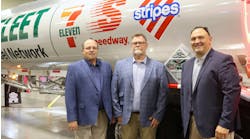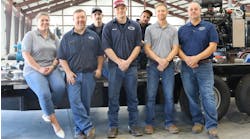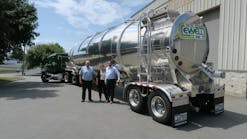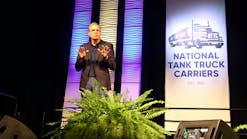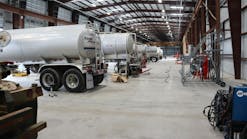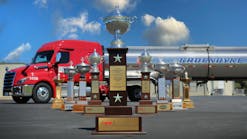With the arrival of May’s warmer spring weather, it becomes a little easier to set aside memories of the back-to-back series of winter storms that swept across North America in mid to late February. The storms brought record-breaking cold temperatures, freezing rain, and snow that created life-threatening conditions in many areas.
In the south-central United States, Texas and adjacent states were especially hard hit. For the first time, winter weather alerts were issued for all 254 Texas counties.
Snow and ice rendered many roads and highways impassable across the region. Widespread power outages left nearly 10 million people without electricity. Drinking water was in short supply due to broken water pipes and water plants that were taken offline. The storms left at least 136 people dead in the United States and northern Mexico.
Tank truck fleets were among the trucking operations that stepped up to meet critical needs during the storms. These companies kept water, food, and fuel moving during some of the most difficult driving conditions.
Hospital water
United Petroleum Transports (UPT), an Oklahoma City, Oklahoma-based, tank truck carrier, responded to a special request for water at two Memorial Herman hospitals in Houston, Texas. The hospitals needed the emergency water shipments after a City of Houston pump station was shut down due to the winter storm. Without the water shipments, the hospitals would have had to shut down their boilers that were for steam heat and hot water.
“UPT leadership quickly realized that we had the equipment on hand that could help alleviate this problem and teamed up with Texas-based water plant, Thermal Energy Corporation (TECO), to help transport water to the two Memorial Hermann Hospital locations,” said David Price, UPT chief operating officer. “Thomas Rubin, one of our Houston-based professional drivers, jumped at the opportunity to help when asked and was able to complete enough loads to keep the boilers running and the hospitals warm.”
Fuel challenges
In addition to the emergency water hauls in Houston, UPT hauled a number of diesel loads to west Texas facilities that were using diesel-fueled generators to provide electricity. The carrier also continued to do its best to maintain shipments of refined fuels to customers across its entire marketing area.
“Road conditions were terrible during the first part of the week of Feb. 13,” Price said. “Houston was pretty well shut down until the end of the week, and Dallas was only slightly better. Refinery output had slowed throughout our operating area due to the power outages.
“We had to make adjustments in our shipment lanes as refineries began drawing down refined product inventories in storage tanks. By Friday (Feb. 19), the weather was improving and people were starting to drive again because they needed essentials, including food, drinking water, and fuel for their cars.
“Refined fuel inventories at storage terminals across the region plummeted over the weekend. Refined product shortages continued well into the second half of March. It was the ultimate test of patience for us because we didn’t always know if product would be available when a transport arrived at a loading rack.”
Solid team
Price adds that he couldn’t be prouder of the way the UPT team stepped up to the challenges of the winter storm. “During a time when millions of people, including some of the UPT family, were without power, running water, and heat, our professional drivers, maintenance technicians, and office staff continued to perform their duties of providing necessary fuels and other important product deliveries,” he said.
“In addition to frigid temperatures, many areas saw a massive snowfall and hazardous road conditions, but it didn’t stop our staff from fulfilling their daily duties or prevent our talented professional drivers from completing their loads. I was incredibly impressed by how our drivers were able to continue to work and stay safe at the same time. Their caution and care for themselves and others on the road was exceptional.”
TXTA coordination
The request for the emergency water hauls that UPT handled came from the Texas Trucking Association (TXTA). This was one of many calls for assistance that were coordinated by the TXTA staff even as they were dealing with storm damage at their offices in Austin, Texas, and their homes.
TXTA helped arrange for tank truck shipments of water to kidney dialysis clinics in the Coastal Bend region of South Texas. Trailer loads of bottled drinking water were directed to hospitals and other locations.
“We sent out alerts on these requests to our members, and they responded immediately,” said John D Esparza, TXTA president and chief executive officer/Southwest Movers Association executive director.
TXTA and SMA also partnered with the American Trucking Associations (ATA), the Trucking Cares Foundation (TCF), and Trucking Moves America Forward (TMAF), the industry-wide education and image movement, to coordinate relief efforts across Texas.
“In times of hardship, the trucking industry always has and always will answer the call to help,” Esparza said. “Whether keeping the economy moving, delivering daily necessities, or providing relief during these catastrophic events, trucks are always rolling, many times stepping away from their own needs to serve others.”
The critical water deliveries were made by ATA’s Share the Road, Workforce Heroes and America’s Road Team trucks. TXTA is part of a relief network that connects companies with communities impacted by disaster. The associations worked hand-in-hand to ensure that national and local businesses were able to participate and provide support during this relief effort for Texas.
Each truckload consisted of about 20 pallets of water (roughly 40,000 pounds). The bottled water was donated with financial support from the trucking industry, as well as additional individuals who donated through an online donation form.
Throughout the storm week, the trucks made deliveries to hospital systems and charitable organizations in Austin, Houston, Waco and other locations.
Esparza describes trucking as the epitome of an “essential” industry, employing more than 700,000 people in Texas and responsible for delivering 82.1% of goods to communities that rely solely on trucks. Eighty-eight percent of trucking businesses in Texas are family-owned—mom and pop shops working hard to contribute to a reliable supply chain.
“This has been a significant year for the trucking industry as their essentiality has become evident to Americans in the delivery of vaccines, water, toilet paper, medical supplies and the list goes on and on,” Esparza said. “An industry that is frequently called upon in times of crisis once again answered the call by delivering to Texas communities in dire need of water and other supplies.”
